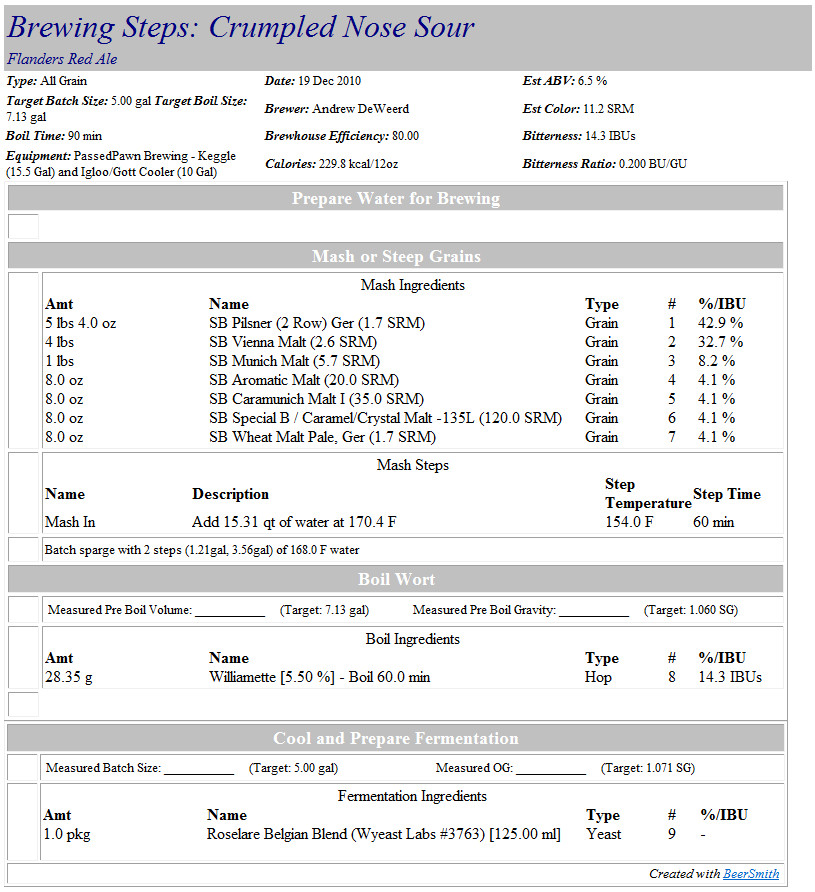Passedpawn would you care to share your recipe & process for the flanders reds you have done? I just did my first one last Friday (only my second ever sour beer). I stuck to Jeff Sparrow's recipe from BYO below. I did a 12 gallon batch and pitched Roeselare. It took off fast and has been fermenting strong since. I just did a single infusion mash step @ 155 was going for 158 and missed it. One question I can't seem to find a solid answer on is aerating. Some say do it, others seem to say don't do it with sours. I aerated it well like I would any other beer.
To keep on topic and hopefully not hi-jack the post here. I'm hop
I must have good timing, I mean to smoke a turkey breast tonight. The breast has been dry brined for about 24 hours. Thinking about salt and pepper with some sage leaves under the skin.
Anything in particular to look out for?
ing that it turns out pretty sour / tart and don't want to end up with the same problem that the OP has. Thanks for any advice.
Acid Ale Recipes
West Flanders Red Ale
by Jeff Sparrow
(5-gallons/19 L, all-grain)
OG = 1.057 FG = 1.0021.012
IBU = 11 SRM = 22 ABV = 6.5%
Ingredients
5 lbs. 5 oz. (2.4 kg) Vienna malt
2 lbs. 8 oz. (1.1 kg) Pils malt
15 oz. (0.43 kg) aromatic malt
15 oz. (0.43 kg) CaraVienne malt
2 lbs. 2 oz. (0.96 kg) raw wheat
5.0 oz. (0.14 kg) special B malt
3 AAU Hallertau hops (60 mins)
(0.75 oz./21 g of 4.0% alpha acids)
2.0 oz. (57 g) oak cubes (medium toast)
Wyeast 3763 (Roeselare Blend) or White Labs WLP655 (Belgian Sour Mix)
Step by Step
Use 1.33 quarts of water per pound of grain (2.8 L/kg). Dough-in 90% of the malted grains to hit 122 °F (50 °C), and hold for 20 minutes. Mash the unmalted wheat and remaining 10% of the malted grain at 145 °F (63 °C) and hold for 15 minutes, then add the adjunct mash to the main mash. Traditionally, brewers use a multi-step mash schedule: Raise to 145 °F (63 °C) and hold for 40 minutes, then raise to 162 °F (72 °C) and hold for 30 minutes. Recently, I've been experimenting with a single step of about 158 °F (70 °C), to promote the formation of "unfermentable sugar" to make the yeast and bacteria work a little harder. Raise to 169 °F (76 °C), and hold for 10 minutes. When finished, sparge with 176 °F (80 °C) water.
Boil for 2 hours at a rolling boil. Cool the beer to 70 °F (21 °C) and pitch it with your yeast blend into a carboy. The Roeselare culture is a complete blend of all of the yeasts and bacteria necessary for fermentation. Ferment at 70 °F (21 °C). Once visible signs of fermentation have finished, rack with the equivalent of 2.0 oz. (57 g) of oak cubes for 5 gallons (19 L) into a second carboy. Put it in a corner at ambient temperature and wait (and wait). With time, a thin white film (pellicle) will form on the top of the beer. Eventually, you will sample the beer and determine that it is ready. Bottle with new yeast and your desired amount of priming sugar. As always, save me a bottle.



